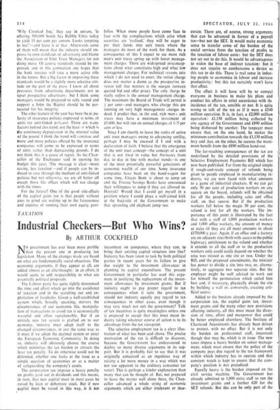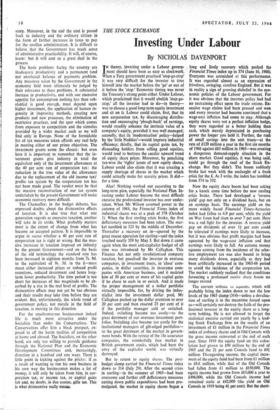Industrial Checkers
—But Who Wins? TAXATION
By ARTHUR COCKFIELD
No government has ever been more prolific than the present one in producing tax legislation. Many of the changes made are based on what are fundamentally social objectives. The economic arguments, if they appear at all, are added almost as an afterthought: in an effort, it would seem, to add respectability to what are essentially political proposals.
The Labour party has quite rightly denounced the time and effort which go into the avoidance of taxation and in the searching out and ex- ploitation of loopholes. Given a well-established system which, broadly speaking, mirrors the circumstances of our economic life, manipula- tion of transactions to avoid tax is economically wasteful and often reprehensible. But if an entirely new tax system is grafted on to our economy, industry must adapt itself to the changed circumstances, in just the same way as it.must if we adopt the decimal system or enter the European Economic Community. In doing so, industry will obviously choose the course which minimises the tax burden or attracts the least tax penalty. To do otherwise could not be defended, whether one looks at the issue as a simple question of economics or as a matter of safeguarding the company's assets.
The corporation tax imposes a heavy penalty on profits paid out in dividends and this means, in turn, that new capital must in most cases be raised by loan or debenture stock. But if new capital must be raised in this way, is it not incumbent on companies, where they can, to bring their existing capital structure into line? Industry has been taken to task by both political parties in recent years for its failure to give due weight to the investment allowances in planning its capital expenditure. The present Government in particular has used this argu- ment in justifying the replacement of the invest- ment allowances by investment grants. But if industry ought to pay proper regard to tax consequences when it suits the government, should not industry equally pay regard to tax consequences in other cases, even though it may very much not suit the government? Talk of tax incentives is quite meaningless unless one is prepared to accept that this must mean in- dustry taking whatever course of action is to its advantage from the tax viewpoint.
The selective employment tax is a clear illus- tration of what has been said above. The precise motivation of the tax is difficult to discover, because the Government has endeavoured to deploy so many diverse arguments in its sup- port. But it is probably fair to say that it was originally conceived as an ingenious way of raising a lot more money in a way which was not too apparent to the ordinary consumer (or voter). This is perhaps a kinder explanation than many that can be thought of. But, not prepared to leave the matter well alone there, the Chan- cellor advanced a whole string of economic arguments which are either irrelevant or inac- curate. There are, of course, strong arguments that can be advanced in favour of a payroll tax—but not the SET. It would make economic sense to transfer some of the burden of the social services from the taxation of profits to the taxation of labour costs: but the SET does not set out to do this. It would be advantageous to widen the base of indirect taxation: but it does not require so cumbersome a device as this tax to do this. There is real sense in induc- ing people to economise in labour and increase productivity: but this tax certainly won't have that effect.
The effect it will have will be to compel everyone in business to make his plans and conduct his affairs in strict accordance with the incidence of the tax, sensible or not. It is quite wrong to talk of the tax as if it were a £240 million operation. It is, in fact, a £2,000 million operation : £1,130 million being collected by one agency of the Government and £890 million being disbursed by another. The taxpayer must ensure that, on the one hand, he makes the minimum contribution towards the £1,130 million levy and that, on the other, he secures the maxi- mum benefit from the £890 million hand-out.
The far-reaching consequences of the tax are underlined by the detailed provisions of the Selective Employment Payments Bill which has now been published. Far from the original simple if rough-and-ready concept of refunds being given to people employed in manufacturing in- dustry, we are now faced with what amounts to a game of industrial checkers. If we can get only 50 per cent of production worker's on any square on the board, refunds will be obtained for all the people, including sales and office staff, on that square. But if the production workers fall below the magic 50 per cent, the refund is lost for all the workers. The im- portance of this point is illustrated by the fact that with a staff of 1,000 production workers and 1,000 office workers, the amount of money at stake (if they are all men) amounts to about £170,000 a year. Again, if an office and a factory are on adjacent sites (both with access to the public highway), entitlement to the refund and whether it extends to all the staff or to the production workers only could easily depend on whether the area was treated as one site or two. Under the Bill, and the proposed amendments, the minister has power to divide a site into two, or, alterna- tively, to aggregate two separate sites. But the employer might be well advised to work out for himself the permutation which suited him best and, if necessary, physically divide the site by building a wall or. conversely, creating arti- ficial access.
Added to the burdens already imposed by the corporation tax, the capital gains tax, invest- ment grants and the many other new provisions affecting industry, all this must mean the diver- sion of time, effort and manpower that could be better employed elsewhere. The Institute of Chartered Accountants has already been driven to protest, with no effect. But it is not only the burden on professional staff, important though that may be, which is in issue. The new taxes impose a heavy burden on senior manage- ment, which must ensure that the policy of the company pays due regard to the tax framework within which industry has to operate and that constant watch is kept to ensure that the com- pany's position is not prejudiced.
Equally heavy is the burden imposed on the civil service machine. The Government has already admitted to 1,000 extra staff to run the investment grants and a further 620 for the SET refunds. But this can be only part of the story. Moreover, in the end the cost is passed back to industry and the ordinary citizen in the form of further increases in taxes to pay for the swollen administration. It is difficult to believe that the Government has much sense of administrative practicability. It will, of course, learn : but it will cost us a great deal in the process.
The basic problems facing the country are inadequate productivity and a permanent (and not unrelated) balance of payments problem. Any measures taken by the Government in the economic field must ultimately be judged by their relevance to these problems. A substantial increase in productivity, and with our excessive appetite for consumption nothing less than sub- stantial is good enough, must depend upon higher investment, the application of human in- genuity in improving methods, creating new products and new processes, the elimination of restrictive practices, and the spur which comes from exposure to competition and the stimulus provided by a wider market such as we will find only in Europe. None of the formidable list of tax measures taken affords any real help in meeting either of our prime objectives. The investment grants come the closest: but even here it is important to remember that the in- vestment grants give industry in total the equivalent only of the investment allowances at the 40 per cent rate of corporation tax: the reduction in the true value of the allowances due to the replacement of the old income tax/ profits tax system by the corporation tax has not been made good. The verdict must be that the massive reconstruction of our tax system undertaken by the present Government will make economic recovery more difficult.
The Chancellor, in the budget debates, has expressed doubts about the disincentive effects of taxation. It is also true that what one generation regards as excessive taxation, another will take in its stride. What probably matters most is the extent of change from what has become an accepted pattern. It is impossible to argue in vacuo whether a 40 per cent rate of corporation tax is right or wrong. But the mas- sive increases in taxation imposed on industry by the present Government—and on the basis of the old terminology the standard rate has been increased in eighteen months from 7s. 9d. to the equivalent of 9s. 3d. in the f—must mean either increased prices or reduced profit retentions, reduced investment and hence long- term lower productivity. The time period is too short for increases of this magnitude to be ab- sorbed by a rise in the real level of profits. The disincentive effects may not yet be too obvious and their results may take time before they are evident. But, unfortunately, the whole trend of government policy, not merely in the field of taxation, is moving in this direction.
For the unadventurous businessman indeed life is much more attractive under the Socialists than under the Conservatives. The Conservatives offer him a bleak prospect, ex- posed to all the harsh realities of competition at home and abroad. The Socialists, on the other hand, are only too willing to provide guidance through the National Plan and the Economic Development Committees and, increasingly, direction in a hundred and one ways. There is little point in kicking against the pricks: if as a result of wanting to run his own business in his own way the businessnian makes a lot of money, it will only be taken from him, in cor- poration tax, or income tax, or capital gains tax and, no doubt, in due course, gifts tax. This is what disincentive really means.







































 Previous page
Previous page